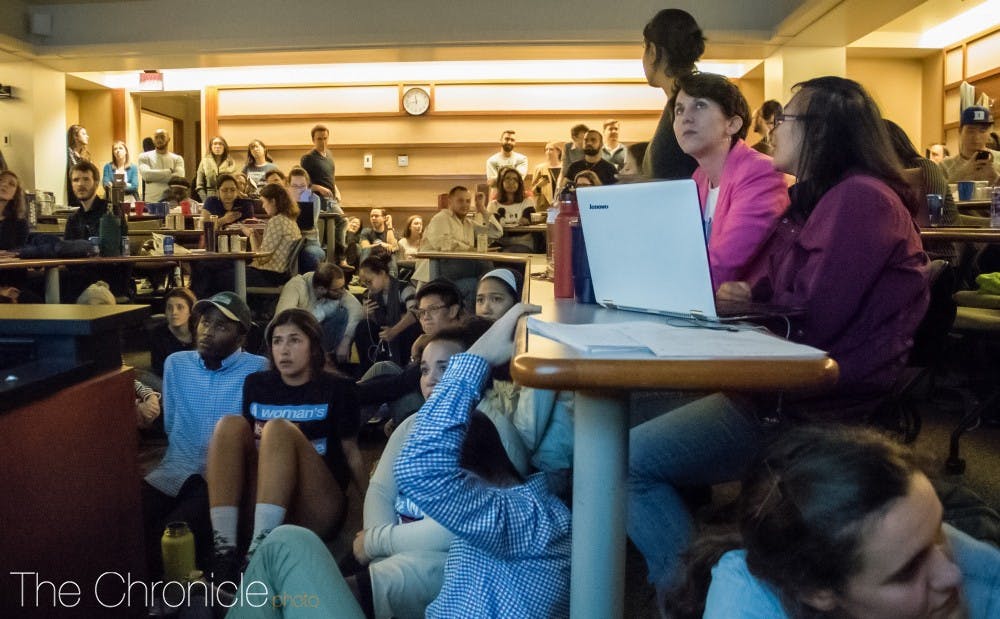For many students on campus, election day in 2016 and the days both before and after were emotionally draining.
The presidential race, characterized somewhat by dismay and disillusionment, culminated in President Donald Trump's election as the 45th president early in the morning Nov. 9. In the days immediately following the win, students felt the results reverberate throughout campus.
“The day after the election, the mood was gloomy, the weather was exactly what you’d expect, completely dark skies. No one wanted to talk about the election,” sophomore Bo Carlson said. “I remember from my classes—I think the professors could sympathize with what we were feeling. Election night was emotional.”
Exit polls in North Carolina showed 57 percent of voters ages 18-29 voted for Hillary Clinton, and 35 percent voted for Trump. On Duke’s campus and throughout the country, Trump's victory sparked dismay and frustration expressed in Facebook comments and a spreading wave of cynicism.
Now almost a year into Trump’s term in office, students say Trump’s leadership has sparked political concern across the campus community, making interest in political issues part of many students’ identities.
Sophomore Ema Klugman said people have more become aware of issues since Trump's election, so there has been more participation in debates and marches.
“Facebook activism has definitely ramped up, and though the efficiency of that is debated, that’s definitely something that’s more present,” sophomore Ivan Robles added. “At least within social media identity, people have been more personally invested in a lot of issues coming up, which I think has positive benefits in terms of awareness and education.”
The policies that Trump’s administration has produced thus far have also seemingly led Duke students to become more engaged with issues that do not directly impact them.
Robles explained that Define American—a new coalition of documented and undocumented students—was created to provide resources for students on campus who were members of the Deferred Action for Childhood Arrivals program.
“The fact that there is a large percentage of students who are documented, who aren’t personally affected by immigration policies, who still feel the necessity to get involved and show up is a direct result of things happening within Trump’s network,” Robles said.
Political leaders on campus have also seen greater involvement and turnout for political events.
“I think that in a lot of ways, Duke—post-Trump—has been a really powerful thing,” said sophomore Leah Abrams, president of Duke Democrats and editorial page managing editor for The Chronicle. “People have been motivated to mobilize and get into political organizing. We’ve had this amazing number of people who want to engage more. We’ve had people who aren’t necessarily in the club showing up at events.”
Abrams found inspiration in this engagement among the student body, commenting on how Trump’s time in office has fostered greater unity across party lines.
“I think [Duke Democrats] has been much more intentional about partnering with the Duke College Republicans and having conversations that don’t further political divisiveness,” Abrams said. “I love being part of that effort.”
Similarly, senior Colin Duffy, president of Duke College Republicans, observed a shift away from antagonism between parties.
“I’ve seen more interest in conducting bipartisan discourse,” Duffy said. “Programs like POLIS have sponsored round-table talks between my group and the Duke Democrats.”
Despite the current student interest in political issues, the overall level of engagement in politics that followed the election and inauguration has subsided, just as in any election cycle, said John Aldrich, a Pfizer-Pratt University professor of political science.
“Unlike the larger U.S., it seems like the salience of politics has gone down, or rather gone down further than in other circles where it is still really high,” Aldrich said.
He added that though a national election is a unifying event that tends to be a focal point of attention because students from across the globe are concerned, politics is not unifying because Duke students are from many different places and do not have a common set of interests and concerns.
Some students have likewise witnessed this drop-off in concern, and some are worried that without continued attention and interest, change will not occur.
“I think people are feeling angry and more involved but there are also a lot of people who aren’t involved and don’t really care and continue to live their lives,” Klugman said.
Furthermore, Carlson said there seems to be a distinction between individuals frustrated with President Trump and the current state of the political sphere, and those who will actually vote to change it.
“I hope what this [election] will do is make people more politically active where it really matters, by voting, and I’m not as optimistic about that,” Carlson said. “You have periods of people being really upset, but there are longer periods of people ignoring politics. The people going to a protest on a weekend after the inauguration aren’t necessarily the same people who are going to go vote on election day.”
Beyond this, some questioned whether a political climate with its energy and vigor established through outrage is necessarily inspiring.
“I don’t think the fact that everyone is really pissed off at the system right now is a good thing,” Carlson said.
Still, other students said that people who are still upset about the election results can find hope in student activism.
“I’m still disappointed in the results of the election, and there have been some terrible things that have come from Trump’s policies, but they’ve been met with really strong political voices and activism,” Abrams said. “If you want to make a change in this environment, you have to say, ‘This is the reality right now. What can I do to change it, fight it and make sure my voice and the voices of the people I represent are heard in the future?’”
Get The Chronicle straight to your inbox
Signup for our weekly newsletter. Cancel at any time.

